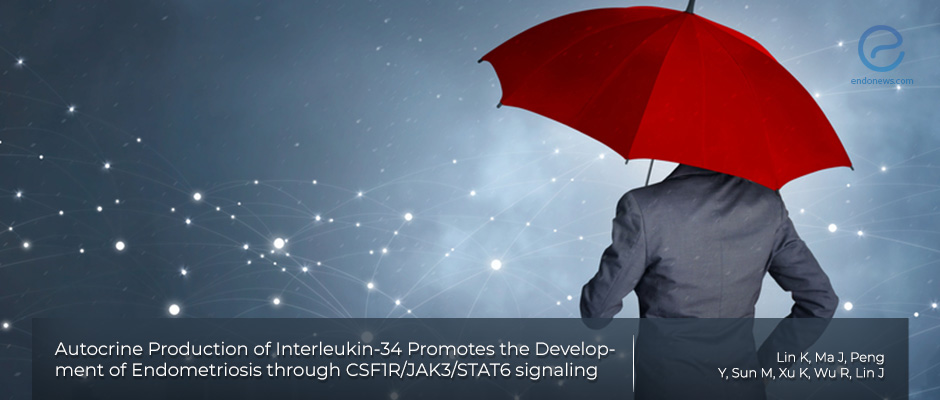Endometriosis signaling: the role of IL-34
Jan 16, 2020
IL-34 as a future target in endometriosis treatment
Key Points
Highlight:
- This study investigated the function of IL-34, a cytokine regulating monocytes, in the pathogenesis of endometriosis.
Importance:
- A newly described cytokine, namely interleukin-34 and its function in endometriosis may provide potential future therapeutic strategies.
What's done here:
- Endometriosis patients (n=90) and non-endometriosis controls (n=90) admitted at Women’s Hospital Zhejiang University School of Medicine, China, were examined in this study.
- The levels of IL-34, VEGF, MMP-2, and MMP-9 in patients’ sera were evaluated.
- Eutopic and ectopic endometrial stromal cells were isolated and studied.
- The efficacy of an inhibitor of the STAT6 transcription factor, namely AS1517499, was tested in rat endometriosis.
Data:
- IL-34, VEGF, MMP-2, and MMP-9 were increased in women with endometriosis.
- IL-34 increased the proliferation, migration, and invasion of eutopic endometrial stromal cells (ESCs).
- IL-34 up-regulated colony-stimulating factor 1 receptor (CSF1R), phosphorylation of JAK3, phosphorylation of STAT6, VEGF, MMP-2 and MMP-9 in eutopic ESCs.
- AS1517499 abrogated the effect of IL-34 and suppressed endometriosis lesions in rats.
Limitation:
- This study is limited by the size of the participants and the institutions at which participants were recruited. A larger and multi-institutional study may be required to validate the data.
Lay Summary
An increasing number of studies have suggested that the pathogenesis of endometriosis is mediated by cytokines, such as interleukin (IL)−17, which promoted the formation and progression of endometriosis by up-regulating angiogenesis and pro-inflammatory cytokines secretion.
IL-34 is a newly described cytokine. It regulates the differentiation and proliferation of monocytes. It can trigger multiple cellular processes such as cell proliferation, differentiation, apoptosis, angiogenesis, inflammation, and immunoregulation by triggering phosphorylation signaling cascades.
The current article by Lin et al. from Zhejiang University School of Medicine, China published in "Scientific Reports" investigated the levels and function of IL-34 in endometriosis.
Initially, the authors analyzed the expression of IL-34 in the Gene Expression Omnibus (GEO) microarray database. IL-34 was increased in endometriosis, though its role in endometriosis is unclear. The study recruited 90 endometriosis patients and 90 non-endometriosis patients who were admitted at Women’s Hospital, Zhejiang University School of Medicine, China. Patients with endometriosis were at advanced stage, with 75.6% and 41.1% had chronic pelvic pain and infertility, respectively. The non-endometriosis patients were cases of mature teratoma and tubal infertility.
The results showed upregulation of IL-34 in the sera of endometriosis patients and in rat models of endometriosis. IL-34 increased expression of colony-stimulating factor 1 receptor (CSF1R), phosphorylation of tyrosine kinase JAK3, phosphorylation of transcription factor STAT6, vascular endothelial growth factor (VEGF), matrix metalloproteinase (MMP-2 and MMP-9) in eutopic ESCs. VEGF, MMP-2, and MMP-9 have been associated with endometriosis pathogenesis, thus IL-34 may participate in several cellular processes dysregulated in endometriosis including proliferation, migration, and invasion of eutopic endometrial stromal cells (ESCs). A chromatin immunoprecipitation (ChIP) assay showed the binding of STAT6 to the IL-34 promoter, and STAT6 inhibitor, AS1517499 abrogated IL-34 induced cellular alterations. Neutralizing antibody against IL-34 attenuated CSF1R/JAK3/STAT6 activation and down-regulated VEGF, MMP-2, and MMP-9. These data were also validated in a rat model of endometriosis in vivo.
In conclusion, these results suggest that IL-34 facilitated the development and progression of endometriosis through CSF1R/JAK3/STAT6 signaling pathway. The knowledge provides new insight for targeting IL-34 and the associated signaling network for the treatment of endometriosis.
Research Source: https://www.ncbi.nlm.nih.gov/pubmed/31727934
inflammation immune cell signaling interleukin rat models metalloproteinase

